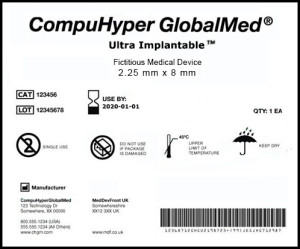Donor screening assays and in vitro diagnostic tests, including laboratory-developed tests, are now classified as IVDs and require a UDI label
Later this month, a new Food and Drug Administration (FDA) rule will take effect that requires unique device identifiers (UDIs) on most medical devices. This will include analyzers, instruments, and automated systems used by clinical laboratories and anatomic pathology labs.
UDIs also will apply to certain combinations of products that contain devices licensed under the Public Health Service Act (PHSA), such as donor screening assays and in vitro diagnostic (IVD) testing, including laboratory-developed tests (LDTs), noted a document describing the new law on the FDA website.
Beginning September 24, 2014, the FDA will begin enforcing this new rule.
Unique Device Identifier Label Contains Specific Information
The unique device identifier is a unique numeric or alphanumeric code that consists of two parts:
- The first part is a device identifier (DI). This is a mandatory, fixed portion of a UDI that identifies the labeler and the specific version or model of a device, and
- The second part is a production identifier (PI). This is a conditional, variable portion of a UDI, which may include one or more device identifiers 1) manufacturer lot or batch number, 2) serial number, 3) expiration date, 4) date of manufacture, or 5) distinct identification code required by CFR 1271.290 (Code of Federal Regulations Title 21) for a human cell, tissue, or cellular and tissue-based product (HCT/P) regulated as a device.

Above is an example of how a unique device identifier (UDI) label looks when placed on a medical device. The label contains information about the product name, its expiration date, reference and lot numbers, manufacturer information, bar code, and details about the item. (Image in the Public Domain)
Unique Identifier Labels are Expected to Provide Specific Benefits
This new law moves healthcare to an identification system similar to the Universal Product Code (UPC) on retail products. The UDI system will improve the quality of medical device adverse event reports, because it will help the FDA and IVD device manufacturers to more accurately identify and track problem products quickly. In turn, this will make it easier for these agencies to better target and manage recalls to improve patient safety. It would also:
- Reduce medical errors by allowing healthcare professionals to rapidly identify a device and obtain information about it;
- Enhance analysis of devices and provide a standard for documenting device use in electronic health records, clinical information systems, and claim data sources and registries;
- Provide a secure global distribution chain, help to address counterfeiting and diversion, and prepare for medical emergencies; and,
- Lead to the development of a medical device identification system that is recognized worldwide.
As part of the UDI system, the FDA created the Global Unique Device Identification Database (GUDID). The GUDID includes a standard set of basic identifying elements for each device with a UDI. Most of this information will be made available to the public so that users of a medical device can easily look up information about the device.
UDIs represent another dimension in the effort to develop international standards for supply chain functions. A related standard identifies the locations of businesses and healthcare providers. Long-time readers of Dark Daily may recall the GS1 Global Location Numbers (GLNs) system that has been adopted for use in healthcare. (Dark Daily, “Hospitals, Clinical Labs, and Pathology Groups Will Soon Adopt Global Location Numbers,” June 10, 2010.)
Scope of Unique Device Identifier Includes In Vitro Diagnostic Tests
One element of the new law is expected to benefit clinical laboratories and anatomic pathology groups. Use of UDI labels on the medical devices and diagnostic instrument systems will make it easier and faster for both the FDA and IVD manufacturers to more accurately identify and fix problems and issues when these devices are used for clinical purposes. Not only would that be positive for medical laboratories, but it would help improve patient safety.
—by Patricia Kirk
Related Information:
FDA Says It Will Take Risk-Based, Phased-In Approach to Monitor LDTs
Benefits of Unique Device Identification
New tracking system proposed to help recall faulty devices
Medical Devices: FDA Should Enhance Its Oversight of Recalls
Hospitals, Clinical Labs, and Pathology Groups Will Soon Adopt Global Location Numbers



